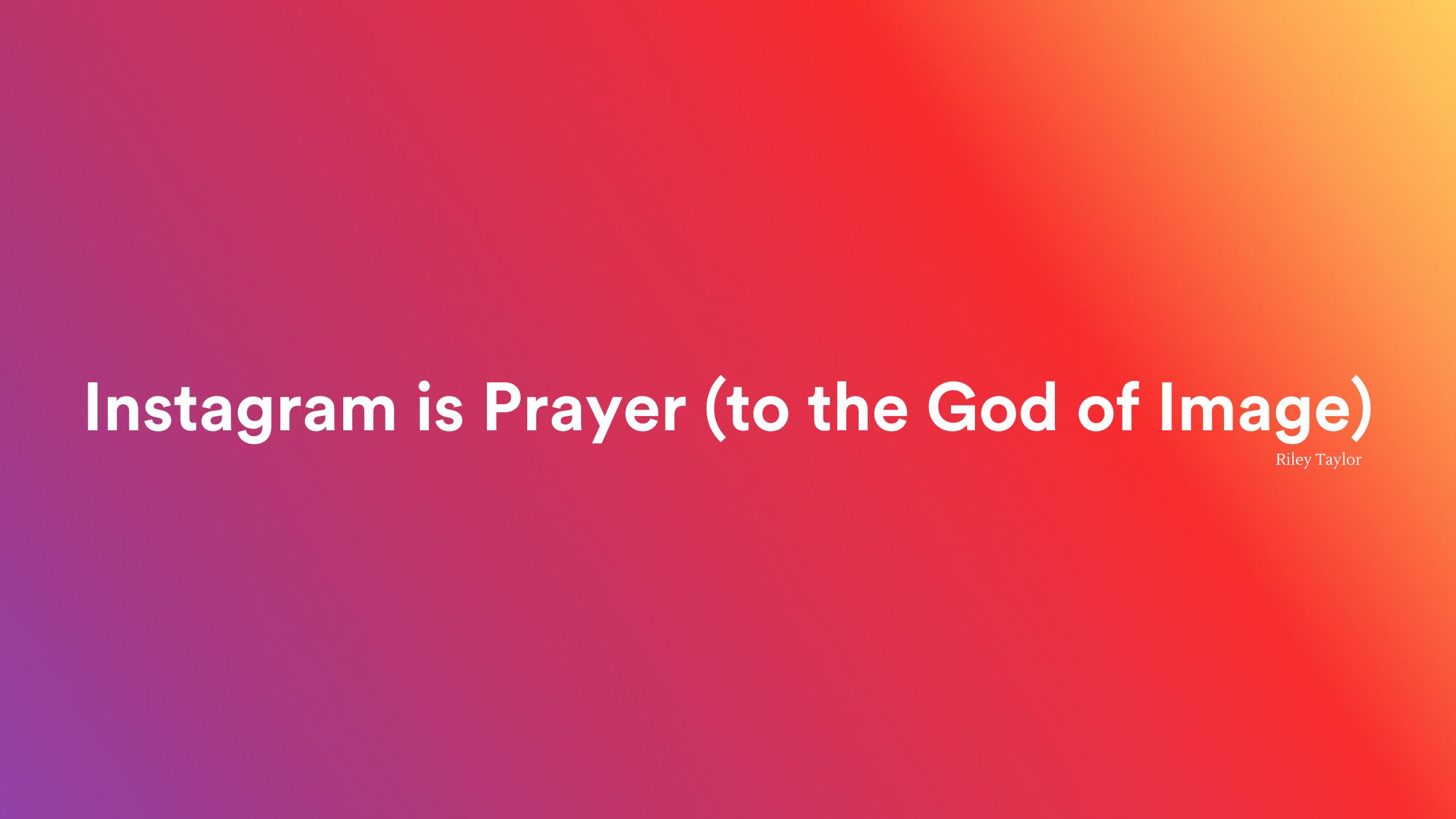
The most basic definition of prayer that I’ve ever seen comes from Ronald Rolheiser, who defines it as “lifting mind and heart to God.”[1] He means that when people pray, they are simply giving attention to what’s going on in their thoughts, dreams, fears, emotions, and lives, before their God.
But here’s an important question: Which god? After all, people all over the world pray—and not all in the name of Jesus. Tim Keller remarks that prayer is as universal as babies crying. “There seems to be a human instinct for prayer.”[2] There are many gods in our world, many idols and ideologies, pursuits and political parties, demanding our time, money, fealty, and prayer.
One of these idols is Image, and one of the most popular ways to “lift mind and heart” to the god of Image is to scroll through Instagram.
Instagram is a place where we go to lift our minds and hearts to things that we care about. It can be used in a benign, even useful, way to post life updates, shop for clothing, make connections, get fresh ideas, see what’s going on in friends’ lives, or catch up on memes. In these cases, we are giving attention to things that make us laugh and meet our needs.
But more often than not, that useful time quickly gives way to an endless scroll of stuff to buy, people to envy, causes to support, accomplishments to brag about, celebrities to care about, conspiracies to believe, and drama to pile on. We fill our imaginations with images and videos that are at worst dangerous, and at best pointless. Despite its many uses, Instagram remains a gateway to porn use, a platform for braggarts, and the go-to destination for teen girls developing toxic views of their bodies. We might as well bow prostrate in front of a statue of Diana herself. Instagram is prayer, “lifting mind and heart” to the god of Image.
What should a Christian do? Delete your profile? As I have written elsewhere, I did just that two years ago, and I haven’t missed it for one second. But I realize not everyone can, or should, do that. Indeed, as Cal Newport has written, social media can be a valuable tool to supplement healthy lives and deep relationships.[3] Instead, allow me to advocate for the spiritual practice of secrecy.
In Spiritual Disciplines Handbook, author Adele Calhoun defines secrecy as “practicing the spirit of Christ reflected in hiddenness, anonymity, lack of display and the holding of confidences.”[4]
In other words, it’s doing what you do without telling anyone else that you’re doing it. It’s the realization that life’s most special moments are best kept private, not shared in public. It’s enjoying the life you have, not the one you wish you had.
It’s serving without posting. It’s holding back on saying what you know to be true. It’s abstaining from revealing your good qualities. It’s praying alone. It’s what Jesus was talking about when he said, “Do not let your left hand know what your right hand is doing” (Matt. 6:3). This practice flies in the face of a culture of Image, which dictates that only the truly important people are seen, liked, and applauded.
Our God is different. He is the Lord of the unseen, the small, the insignificant, and the lowly. Mary extolled the Lord because he had “exalted those of humble estate” (Lk. 1:52). In Matthew 6, Jesus goes on to teach, “But when you pray, go into your room and shut the door and pray to your Father who is in secret. And your Father who sees in secret will reward you” (v6). God not only sees in secret, and rewards those who practice secrecy, but he himself “is in secret.” As Jesus’ reputation grew and his chances at glory increased, he rejected that applause. Even though “the report about him went abroad, and great crowds gathered to hear him and to be healed of their infirmities,” it says that “he would withdraw to desolate places and pray” (Lk. 5:15-16). Ultimately it was in this secret manner that Jesus went to the cross, rejected by men and abandoned by his disciples. But God, the true God of secrecy, was there with him the whole time.
I have been making the case that we should understand what’s happening in our hearts when we scroll through Instagram: we may very well be praying to the god of Image. That god will form us into its own image—envious, insecure, and selfish. “Those who make [idols] become like them” (Psa. 115:8). Instead, Christians ought to make a habit of praying to the one true God. This might require deleting, or taking a break from, your accounts. Whatever it takes, lift your mind and heart to him, no one else. And the God who is himself in secret will hear you and form you into his image (see Col. 3:9-10; Rom. 8:28-29).
References
- Ronald Rolheiser, Prayer: Our Deepest Longing.
- Tim Keller, Prayer.
- Cal Newport, Deep Work, and Digital Minimalism.
- Adele Calhoun, Spiritual Disciplines Handbook, 118.










